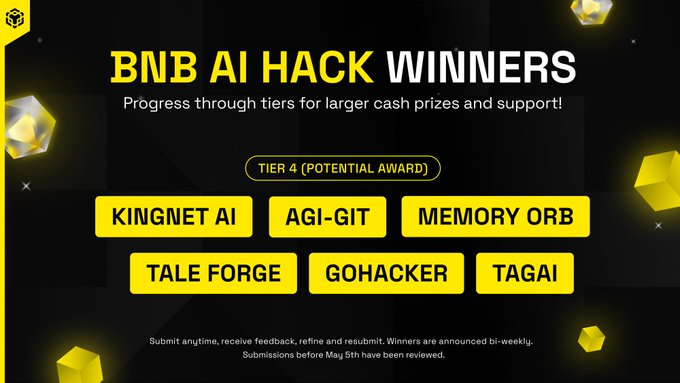Core Mechanism and Objectives of BNB AI Hack
BNB Chain launched the BNB AI Hack in February 2025 to accelerate the integration of AI technology and blockchain. The initiative adopts an open innovation model with no fixed deadlines or track limitations, allowing developers to submit projects for evaluation at any time. Its core rules include:
-
Tiered Reward System: Projects are divided into Tier 1 to Tier 4 based on potential, with a maximum reward of $10,000 cash and $50,000 in startup resources;
-
Technical Focus: Prioritized support for AI-driven DEX trading bots, on-chain data analytics, smart contract security, etc.;
-
Ecosystem Support: Promoted projects can join the BNB Chain Incubation Alliance (BIA) and MVB accelerator to gain technical and market resources.
As of May 2025, over 500 global projects have participated, covering areas such as decentralized AI tools, generative content platforms, and privacy computing protocols. This market insight article discusses the technical features, advancement mechanisms, and impact on the Web3 ecosystem of the BNB AI Hack winning projects.

Latest Winning Projects and Technical Analysis
On May 13, 2025, BNB Chain announced the latest batch of potential award-winning projects (judged on May 12). Six teams stood out from 30 submissions:
-
Memory-Orb: Enhances on-chain data retrieval via AI, improving query efficiency by 300%;
-
Tale Forge: Dynamically generates NFT narratives, allowing users to interact and change storylines;
-
GoHacker: Uses machine learning to predict smart contract vulnerabilities with over 92% accuracy;
-
TagAI: Tags DeFi users to improve precision of personalized protocol recommendations;
-
AGI-Git: An AI code collaboration platform supporting automated smart contract review and optimization;
-
Kingnet AI: Aggregates liquidity from 12 chains and reduces slippage to 0.15% through algorithms.
These projects must launch on mainnet and pass technical verification before applying for Tier 1–3 advancement to unlock higher rewards. For example, Tier 1 projects will receive an incubation ticket and $10,000 in funding.
Historical Project Advancement Evaluation and Ecosystem Impact
Currently, the first batch of mainnet-launched projects is undergoing advancement evaluation, including 10 potential projects such as BINK AI, Botzilla, and Tutorial Agent. Taking Tutorial Agent as an example, this AI-driven DApp education platform has been launched on over 30 exchanges, with over 50,000 users and more than 12,000 daily on-chain activities. Evaluation criteria include technical feasibility, user growth, on-chain activity, and business model sustainability.
Successfully promoted projects will receive tiered support:
-
Tier 3: $5,000 reward + marketing resources;
-
Tier 2: $7,500 reward + access to technical mentors;
-
Tier 1: $10,000 reward + eligibility for the incubation program.
This initiative drives technological iteration within the ecosystem. For example, AGI-Git’s code review tool has been adopted by top protocols like PancakeSwap, reducing development barriers by 40%.
Market Response and Industry Challenges
BNB AI Hack has energized the developer ecosystem, with institutions such as Jump Trading and Polygon Ventures initiating due diligence on certain projects. However, challenges remain:
-
Commercialization Pressure: Most projects rely on token incentives and need to explore sustainable models like subscriptions or fee-sharing;
-
Regulatory Risks: AI-generated content (such as Tale Forge’s dynamic stories) may face copyright disputes;
-
Technical Competition: Ethereum-based AI protocols like Bittensor are expanding rapidly, creating cross-chain competition and cooperation.
Investors can track the performance of related tokens via the JuCoin market page — for example, the TUTOR token of Tutorial Agent has increased by 37% in the past month.
Future Outlook: Integration Path of AI and Web3
Future plans for BNB AI Hack include:
-
Technical Expansion: Introduction of the ZKML (Zero-Knowledge Machine Learning) track in Q3 2025 to enhance privacy computing capabilities;
-
Global Cooperation: Building regional incubation centers in collaboration with Southeast Asia’s Kumu and the Africa Blockchain Alliance;
-
Ecosystem Integration: Promoting the integration of winning projects into top protocols like PancakeSwap and Axie Infinity to realize real-world applications.
Industry analysis points out that the integration of AI and blockchain will foster a “self-evolving” ecosystem. For instance, GoHacker’s vulnerability prediction model can update in real-time, forming a self-reinforcing security network. However, technical reliability, user education, and regulatory compliance remain key bottlenecks.




